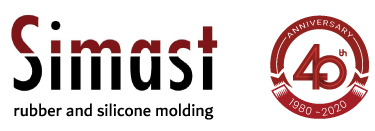The rubber manufacturing process was invented by Charles Goodyear in the first half of the past century: through this process, called vulcanisation, during which the rubber was chemically bound to the sulphur, he obtained an elastic material with amazing characteristics.
Today vulcanisation, which is carried out through molding machines equipped with heated plates, consists of modifying the molecular conformation of the elastomer, through a chemical reaction that causes the polymer macromolecules to bind, increasing the elasticity and the tensile strength of the vulcanised rubber, as well as its resistance to oxygen-induced effects.
Vulcanisation, therefore, is carried out by adding to the elastomer a catalysing source (sulphur or other catalysts according to the polymer), plus several additives like mineral fillers, plasticisers, protective agents and accelerators, to improve the performances of the molded products.
The combination of these elements forms the mix.
In our plant we process both mixes prepared in-house in our compounding department and mixes produced by our technological partners, all world leader companies in the production of elastomers and molding mixes.
Our production plant is equipped with latest-generation presses for the compression and injection molding of all the elastomers available on the market, all controlled by microprocessors.
Today Simast produces items molded with natural rubber, EPDM, SBR, CR, NBR e HNBR, FKM, paste silicone (VMQ) and liquid silicone (LSR), as well as special rubbers and thermoplastic materials.
We specialise in the production of technical articles with metal or thermoplastic inserts molded with any type of rubber and silicone
For these activities we have in-house sand-blasting, painting and coating departments, for the priming of the inserts to be overprinted.
Once the production processes are completed, we carry out more operations internally, like the cryogenic finishing of the molded pieces with the help of liquid nitrogen trimming machines, as well as the die-cutting of rubber sheets and the post-curing, which is required to ensure that the molded products are suitable for food and medical use or to improve the technical characteristics of any product requiring a post-treatment in a oven.
All production is supported by a computer-controlled system allowing us to maximise the efficiency of the production system and to have full control of every stage of the processing undergone by the final product.
Quality monitoring and control extends to each processing step, using our in-house qualified personnel and sophisticated measuring and test instruments.
